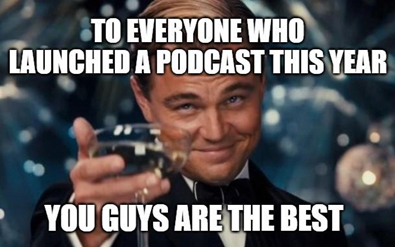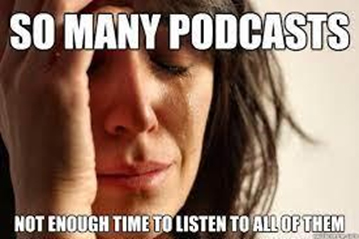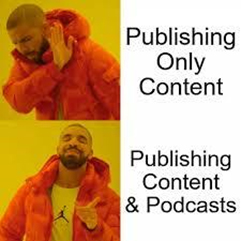In the wave of the current trends, podcasts are riding the high tides with their increasing demand and rapidly growing listenership. PR agencies can make use of this advantageous platform to promote their clients and provide them with a voice to communicate their brand stories. The structure of podcasting is set in a format that enables influential story-telling, hence the longer air time a brand gets on a podcast, the more reach it is susceptible to. The concise form of speech is equally educative and entertaining, capturing the attention of a large demographic of listeners. The ease of access to podcasts makes them a favourite among several working professionals, students, stay-at-home individuals, and travellers.

Note: The 4 steps to using podcast platforms for clients/brands are further explained using examples from your-space’s podcast journey. (your-space – one of the largest student housing companies in India)
Step 1 – Selecting the perfect podcast to match.
With the rising popularity of podcasts, there will soon be a podcast for every topic imaginable, bringing like-minded groups and individuals together not just on their recordings but also among their listenership. PR agencies can utilise this sense of community to promote their brands appropriately. A perfect match between podcasts and brands can be established after a thorough research has been conducted on the content of the podcast. Two aspects to consider when choosing the right podcast include:
- Relevance to client – As important as it is to find a podcast tackling the relevant beat for a client, PR agencies must also ensure that their client can contribute credible information for the conversation on the podcast. For example, a real-estate company will require a podcast that digs deeper and converses on the topic of realty.
- Quality of podcast – PR agencies must check through the topics discussed on the podcast to note their authenticity, ratings and comments. A podcast’s positive listener engagement will factor into the decision of whether or not it is fit for the potential client to be featured in. PR agencies must research for podcasts that leave listeners awaiting the following episode.
Looking at the previous episodes and brands featured in them can also highlight the response for a PR agency to expect from working with that podcast.

For example: Concrete Conversations, a real-estate podcast was selected for your-space upon their successful lead in the metropolitan cities, particularly Mumbai and Delhi. A real-estate podcast was the perfect choice because it targeted listeners from within that industry or those that were interested in real-estate. In both cases, information about your-space’s achievements, their strategies, the difference they have made, and their take on the market and its future were appropriately conveyed to gain more awareness and recognition for the brand.
Link: https://open.spotify.com/episode/3iOV3leLzszgxEfb2xJj6I
Pro Tip: Check out all audio platforms using keywords applicable to the designated industry.
Step 2 – Delivering the right storyline.
Podcast has a reputation of fueling conversation around important and lesser-known or discussed topics, because of how it historically started off with its niche following. Listeners till today circle back to podcasts to find one-stop sources of news, opinions, and strategies, hence the importance of conversation delivery in podcasts is crucial to upkeep listenership. Several podcast-recordings promise to deliver exciting and unique content but miss the mark. PR agencies need to prioritise story-telling and structure of conversation on the podcast as much as quality of content. Listeners need to feel content having found the information that they came for, with relevant, engaging, and educative content. It is essential to remember that the tone a podcast sets – through its delivery – will be the voice of the brand and how it will be perceived. Based on this tone that is either emotional, relatable, or entertaining, the conversation in the podcast needs to be structured for its uninterrupted time that the brand receives, unlike on any other platform or medium.

For example: your-space was featured on Aditi Surana’s Daily Mental Fit Bit podcast. It may seem like an unexpected choice considering your-space is a real-estate company. However, focusing solely on a single industry-oriented podcast deprives the brand the opportunity to obtain a greater reach, as well as limits the options for PR personnel to find like-minded podcasts to collaborate with. The key here is to relate to the podcast selected and find a suitable point of conversation – deliver an appropriately themed story to interest the new set of audience. In this case, your-space spoke of mental health and its importance to provide a safe space and normalise the discussion around it, especially for youngsters. Your-space was the right fit for this conversation because of how closely it worked with young-adults: housing them, and providing a community for them.
Pro Tip: Understand the brand well to be able to recognize similar interests between podcasts.
Step 3 – Preparation and practice makes the podcast perfect.
PR agencies need to approach the podcast creators and schedule a date for the podcast recording. Following which, PR agencies must prepare a script for the conversation on the podcast by establishing appropriate questions first, consented by both: podcast hosts/creators and client. This script will ensure the delivery format, whereby neither party deters from the agenda that the episode establishes. It will act as a reminder of all key points, and will keep the flow intact leaving neither conversationalist to feel left out or experience uncertainty when stating a point. This preparation will also ensure that all the points being discussed have been thoroughly fact-checked. PR agencies can also organise mock sessions with their clients to run them through the procedure and show them how the recording is set up.

For example: Upon having already successfully recorded two podcasts with the brand, the third one – People Who Matter with Bhargavi Swami, came quite easily. The structure and flow of the podcast episode was pre-established. Questions were shared from the interviewer beforehand to allow the interviewees (spokesperson from the brand) to prepare for and approve the questions in advance. This podcast was chosen because of its rising popularity, which gave your-space a larger audience to reach out to.
Pro Tip: Conduct mock interviews and recording sessions to familiarise the spokesperson with the flow of the podcast episode.
Step 4 – Post podcasting.
After the recording has taken place, podcasts usually take a designated amount of time to release on their online – digital platforms. During this period, PR agencies can look into a promotional plan on how they would like to launch the release of the episode dedicated to their clients, within their circle. It is important to start mentioning the podcast to the clients’ followers a few weeks before the release, just like posting teasers and trailers – little snippets of the actual recording. This will enable them to already have context for when the episode actually releases. It also helps build excitement among the followers who are not fully aware of podcasts!

Pro Tip: Posting interactive stories on social media regarding the release of the podcast can help build the excitement among followers.
To conclude, incorporating podcasts into a brand’s promotional plans can provide the company uninterrupted air time and a platform reaching a largely interested audience, like no other. This opportunity to share a brand’s story, values, strategies and thoughts regarding their corresponding industry is an opportunity that must be utilised, especially with its rising popularity among people of all age groups. Following the 4 simple steps discussed above will help select the right podcast, understand how that particular podcast can benefit a brand, and streamline the script for the podcast accordingly. With the help of mock recording sessions and preparing for the episode release, any brand going forward will be able to conduct such podcast collaborations efficiently.